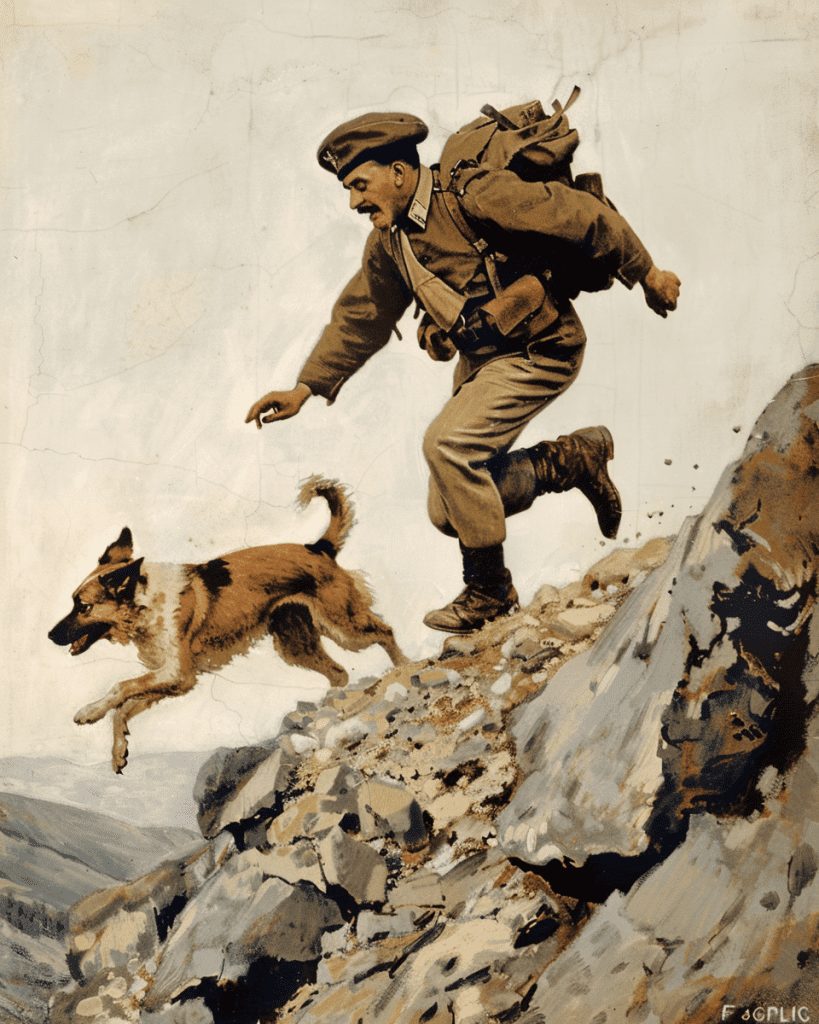The War of the Stray Dog was a brief yet intense conflict between Greece and Bulgaria in 1925. This unexpected clash started when a Greek soldier pursued his stray dog across the border into Bulgaria, leading to a skirmish near the border town of Petrich.
The incident escalated quickly, resulting in a Greek invasion of Bulgarian territory.
This seemingly trivial incident caught the attention of the League of Nations, which had to step in to resolve the conflict.
Armed clashes and heightened tensions were diffused when the League managed to broker the Petrich Agreement, bringing a halt to the hostilities.
Greece was ordered to compensate Bulgaria for the damage caused, ending the brief but significant episode.
Known also as the Incident at Petrich, this event serves as a fascinating example of how minor incidents can lead to international crises. It underscores the fragile nature of peace in that era and the importance of effective conflict resolution mechanisms.
Historical Context
The “War of the Stray Dog” occurred against the backdrop of a tumultuous period in the Balkans. Key factors included the political climate of the early 20th century and the tense relations between Greece and Bulgaria.
Balkan Politics in the Early 20th Century
In the early 20th century, the Balkans were a region of immense political complexity. Nations in the area had recently gained their independence from the Ottoman Empire.
Ethnic tensions and nationalist movements surged, leading to conflict and shifting alliances.
The Balkan Wars (1912-1913) and World War I altered regional borders. Bulgaria, after siding with Germany in WWI, faced territorial losses that exacerbated regional instability.
Treaties, such as the Treaty of Neuilly-sur-Seine, redrew boundaries, creating friction between neighboring states.
This volatile mix of unresolved disputes set the stage for future conflicts.
Greek-Bulgarian Relations
Greek-Bulgarian relations were strained throughout the early 20th century. Both countries engaged in contentious border disputes.
One notable conflict was the Second Balkan War in 1913, which saw shifting territorial control.
Post-World War I treaties granted Greece land at Bulgaria’s expense, creating further animosity.
Economic struggles and political instability worsened the distrust.
By 1925, tensions reached a peak. A seemingly trivial event – a Greek dog crossing into Bulgarian territory – led to violence.
This incident, known as the Incident at Petrich, demonstrated the fragile nature of peace in the region.
Outbreak of the Conflict
The War of the Stray Dog began with a small incident that quickly escalated. Greek and Bulgarian forces came into conflict after a Greek soldier crossed the border.
The Incident at the Border
The crisis started at the Greek-Bulgarian border near Petrich. A Greek soldier reportedly chased his dog across the border. In the confusion, Bulgarian sentries opened fire, killing the soldier.
The Greeks demanded an apology and compensation from Bulgaria. When Bulgaria refused, the Greek government decided to take military action.
This minor incident led to an organized Greek invasion of Bulgarian territory near Petrich.
Initial Military Engagements
Following the border incident, Greek troops advanced into Bulgaria. The Greek army quickly occupied several villages around Petrich.
Bulgarian forces, caught off guard, found themselves outnumbered and retreated. The fighting was brief but intense in the mountainous terrain, which made movement difficult for both sides.
International Response
The War of the Stray Dog, a brief 1925 conflict between Greece and Bulgaria, drew significant international attention. Key players such as the League of Nations and various diplomats became involved to resolve the crisis and prevent further escalation.
League of Nations Intervention
The League of Nations played a crucial role in deescalating the conflict. When Greek forces invaded Bulgaria near Petrich, the League quickly stepped in.
Both nations were members of the League, giving it authority to mediate. After the killing of a Greek captain by Bulgarian soldiers, tension escalated rapidly.
The League called for an immediate ceasefire. They dispatched a commission to investigate the incident and assess the situation on the ground.
The League’s decisive actions and neutral stance were vital in preventing a prolonged conflict.
Their intervention led to the withdrawal of Greek troops back to their borders and facilitated peace talks between the two nations.
Diplomatic Negotiations
Diplomatic efforts were critical in resolving the War of the Stray Dog.
Following the intervention by the League of Nations, diplomats from both countries engaged in intensive negotiations.
Greece and Bulgaria had longstanding territorial disputes exacerbated by the recent military clash.
Envoys from both nations participated in several meetings organized by the League to address the root causes of the conflict.
These negotiations focused on ensuring that such incidents would not recur.
They reached an agreement that included compensation for damages and the establishment of joint monitoring of the border area to prevent future misunderstandings.
Resolution of the Conflict
The War of the Stray Dog ended with a ceasefire and treaty agreements aimed at stabilizing the region and preventing future conflicts between Greece and Bulgaria.
Ceasefire and Aftermath
- Both countries sought to avoid further bloodshed
- Greek forces withdrew from Bulgaria; League observers monitored the situation
- A tense but peaceful standstill followed, with casualties treated and bodies returned
- Leaders focused on diplomatic solutions despite divided public opinion
Impact and Consequences
The incident had significant military and political outcomes, affecting Greek-Bulgarian relations and highlighting the complexities of international diplomacy.
- Greek forces briefly invaded Bulgarian territory near Petrich, resulting in casualties
- The conflict underscored the volatility of border disputes and the importance of international organizations in peacekeeping
- Both countries reassessed their military strategies and border security protocols
Political Ramifications and Historical Analysis
The incident strained Greece-Bulgaria relations, with lasting political consequences:
- The League of Nations ruled Greece must pay Bulgaria £45,000 (about $62,000) in compensation
- This decision reinforced the League’s authority in conflict resolution
- The event highlighted the fragile peace in the Balkans and the importance of diplomatic communication
Historiography
The “War of the Stray Dog” has been examined through various lenses over time. Perceptions have evolved from contemporary accounts to modern analyses, offering insights into:
- The role of international organizations in early 20th-century diplomacy
- The complexities of Balkan politics and border disputes
- How seemingly minor incidents can escalate into international crises
Contemporary Perspectives
During the 1925 incident, both Greek and Bulgarian sources provided biased narratives.
Greek media emphasized the nation’s victimhood and justified their military response as a matter of national pride. Bulgarian reports depicted Greece as the aggressor, invading over a trivial mistake.
These accounts were shaped by intense nationalism and the political climates of both nations.
Contemporary observers often failed to recognize the broader regional tensions. Instead, they focused heavily on the immediate events: the stray dog, the Greek captain’s death, and the subsequent border clashes.
Both countries used the incident for propaganda, fueling public emotions and widening the rift between them.
Modern Analyses
Modern historians take a more nuanced approach, considering the incident within the broader context of Balkan history.
They examine the role of ethnic tensions, unresolved territorial disputes, and the power dynamics of post-World War I Europe to explain why such a minor event escalated into armed conflict.
Current scholarship often critiques the over-simplification of past narratives.
Historians highlight how both Greece and Bulgaria used the incident to pursue larger political goals, depicting the “War of the Stray Dog” as a consequence of strategic maneuvering rather than an isolated event.
Modern analyses seek to provide a balanced view, integrating various perspectives and recently uncovered documents.
Commemoration
The War of the Stray Dog, despite its seemingly trivial cause, has left an impact that is remembered through various means. This includes dedicated monuments and cultural depictions that echo the historical significance of the incident.
Monuments and Memorials
Several monuments have been erected to honor those involved in the Incident at Petrich.
In Greece, a statue in the town of Petrich commemorates the conflict. It features a soldier holding a rifle, symbolizing the clash that ensued.
In Bulgaria, memorial plaques have been placed near the border area. These plaques detail the events and pay tribute to both Greek and Bulgarian soldiers.
The memorials serve as a reminder of the tensions that once existed but also symbolize hopes for peace and cooperation.
School children and tourists often visit these sites to learn about the historical event.
Cultural Depictions
The War of the Stray Dog has also found its way into various cultural depictions.
Several documentaries and films have been produced, highlighting the bizarre nature of the conflict.
These visual media efforts provide an educational yet engaging look at the events, reaching audiences who may not be familiar with the historical details.
In addition, numerous articles and books analyze the incident, often focusing on the broader political and social ramifications of seemingly minor events spiraling into larger conflicts.
Museums in the region sometimes feature exhibits dedicated to the clash, including artifacts and photographs from the period.
These cultural depictions help keep the story alive and accessible to new generations.

